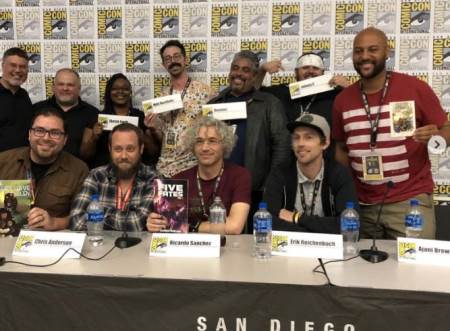Comics to Read in Honor of Black History Month
SDSU Africana Studies lecturer and MFA in creative writing alum Ajani Brown is author of comic on the list.

When students study comics, they dig into a world of superheroes, science fiction, and fantasy, but they also encounter an opportunity to analyze such issues as racial injustice, pandemic diseases, and history.
With Black History Month upon us, Pamela Jackson, Special Collections and University Archives pop culture librarian at San Diego State University and co-director of the Comics@SDSU collaborative, created a list of must-read comics featuring Black characters and authors.
On the reading list is “Straight Outta Freemanville,” a fantasy comic featuring historical figure Stagecoach Mary, written by Ajani Brown (‘05, ‘12), lecturer in Africana Studies. The story is set in the fictional town of Freemanville, a sovereign nation. In Brown’s comic, though, it is more than just a town — it’s a philosophy of independence.
Related Content: SDSU Celebrates Black History Month with In-person, Virtual Events
“I was inspired by the all-Black western movie called ‘Posse’ with Mario Van Peebles,” Brown said. “I decided to write a story about a Reconstruction-period town — with a retro twist — that came from my research on small towns throughout the U.S. like the Greenwood district of Tulsa, Oklahoma and Allensworth in California.
The comic is described as “a weird western, steamfunk, historical fantasy set in the post Civil War frontier town of Freemanville, USA, was founded by free and newly freed African Americans who moved west to escape the harsh conditions of the Antebellum South. The town is self-sustaining and technologically advanced, but under constant threat by marauders both of this world and not.”
Comic-Con Connection
Brown found his collaborator in artist Erik Reichenbach at a Comic-Con’s Comic Creator Connection networking group. Brown calls it “speed-dating for comic creators.” The team received the All-Star award for their work on “Straight Outta Freemanville” in 2019, and they were featured in a panel with other winners that year.

“Ajani and I both have a lot of creative concepts and ideas, and that’s something that drew me to work with him,” Reichenbach said. “I can’t say enough good about the Comic Creator Connection, since oftentimes artists are screaming to themselves, ‘Where can I find a writer to collaborate with?!,’ and writers are screaming, ‘Where can I find an artist that fits my style?!’” Brown later co-produced the “Afrofuturism Black to the Future” panels in 2020 and 2021, during Comic-Con@Home.
Reichenbach created a timelapse video for the presentation to demonstrate how the illustrations transition from black-and-white line drawings to full-color images for the finished comic.
For now, “Straight Outta Freemanville” is a digital series. Five to eight issues will complete the first run and then a new storyline for the next edition will begin. The development process is flowing well for Brown and Reichenbach, the duo is now working on issues No. 3 and 4.
“Ajani provides me with the story, what he is envisioning for framed, and then has it broken down into panels,” Reichenbach said. “Within that structure I am able to creatively solve the remaining space, since we’ve discussed the world of ‘Straight Outta Freemanville’ beyond just the plot.”
Brown might bring together a scene of a high-speed chase across the desert, and include the feeling of it, the characters involved, and the language used, and that leaves Reichenbach free to create the physical environment: the bushes, rock formations, old carriage wrecks from previous chases, and other visuals that lend to the storyline.
Alternative World
Brown’s Afrofuturism course (AFRAS 466) is an interdisciplinary study of African and African American contributions to science fiction, comic book art, pop culture, and its origins and influences. When Brown was a student at SDSU there was no such course in the curriculum. In 2013, he created the course to fill that need.
“Students love this course, because I introduce them to comics and science fiction that they might not be assigned in other courses,” Brown said. “It’s a hybrid class with literature and comics, all with the political undertones of African Americans and science fiction. Basically it’s Black Lives Matter in space.”
Brown said the course gives him a chance to expose students to a different way of thinking.
“The philosophy of Afrofuturism is creating alternative spaces for people of African descent to express themselves politically,” said Brown. In addition to the dozen comics highlighting Black creators, Jackson has prepared a list of Afrofuturism Comics in the library archives. Elizabeth Pollard, professor of history, and co-director of Comics@SDSU and the Comics and Social Justice project, said plans are underway to develop courses that focus on the impact of Black comics and comic authors through support from the new NEH curriculum-building grant.
Related Content
Black Resource Center’s 4th Birthday
Monday, February 28 | Noon – 2 p.m. Celebrate the fourth year of the establishment of the Black Resource Center and its impact and contribution to Black students at SDSU. For more information on Black History Month programming, visit the Black Resource Center website and follow the center on Instagram @sdsubrc.



